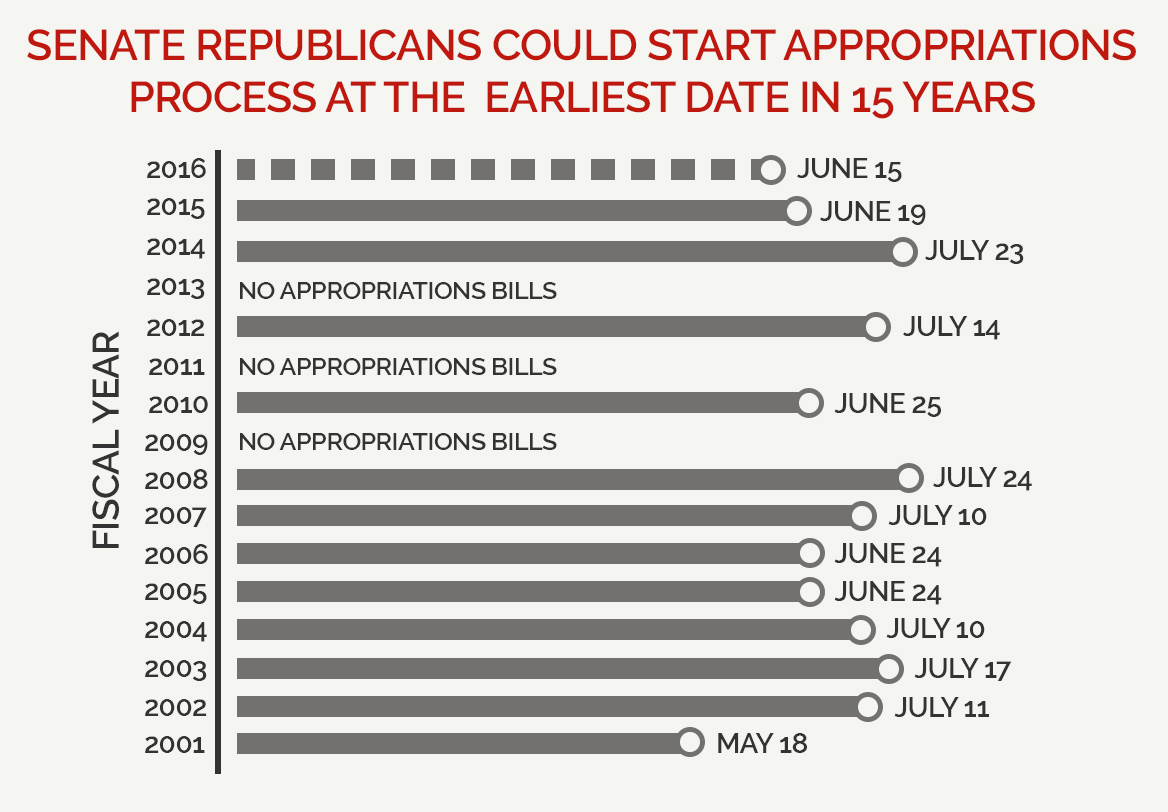Appropriations Start with Fully Funding Defense
- The Republican Congress is ready to return to the basics of governing – passing appropriations bills and conducting oversight of the executive branch that accompanies the appropriations process.
- Senate Democrats are refusing to even debate appropriations bills, because they are unhappy with non-defense spending levels. They, and President Obama, agreed to these spending levels when they were in the majority.
Senate Democrats reportedly will filibuster any attempt to debate appropriations bills, even funding our national defense. Even though both parties fund defense at the president’s requested level, Democrats want to force increases to non-defense discretionary funding in other appropriations bills. It is irresponsible for Democrats to hold up funding for our military over a political disagreement about domestic spending.

With Republicans in charge of Congress, this year’s appropriations process is set to get back to regular order. The House started floor debate of their appropriations bills at the earliest date since 1974. If Senate debate begins after defense authorization, the defense appropriations bill would be the earliest the body has begun the appropriations process in 15 years.
How we got here
The domestic spending that Democrats claim is too low has been the result of several bipartisan budget deals agreed to by Democrats and President Obama. First, the Budget Control Act created what became known as the Super Committee, which was directed to find savings in the budget. When that effort failed, the BCA discretionary spending caps were automatically lowered to achieve savings. With respect to the revised caps, defense spending was effectively cut by $54 billion each year starting in fiscal year 2013. Cuts to non-defense discretionary spending were lower – $37 billion in 2016, with smaller cuts in later years.
After raising both the defense and non-defense caps in fiscal years 2014 and 2015, in exchange for other offsets, the Bipartisan Budget Act (“Ryan-Murray” budget deal) did not raise the caps for 2016. Regular discretionary spending is set to total $1.016 trillion in 2016, up slightly from $1.014 trillion in fiscal year 2015.
What the spending caps are for
Democrats seem to have forgotten – or disregarded – what the BCA caps were for in the first place. In order to get a debt limit increase that would last beyond the 2012 election and therefore eliminate the need to actually address our long-term debt crisis before that election, President Obama agreed to the spending caps. His advisors actually proposed the sequester as a fallback option if the Super Committee failed to produce sufficient savings. Congress has still not adequately addressed Washington’s long-term spending problems, but Democrats want to undo even the moderate spending restraint that has been passed into law so far.
It should be noted that while spending restraint is incredibly important, national defense is a top priority of government. The National Defense Panel Review of the 2014 Quadrennial Defense Review counseled that “national defense needs should drive national defense budgets, not the opposite.” Defense spending cuts account for 50 percent of the spending cuts required by the BCA automatic enforcement mechanisms. On the other hand, the true drivers of our debt, entitlement programs, took very few cuts and nothing close to the structural reforms they require for future solvency.
Democrats want to shut down defense
Despite Democrats’ desire to spend taxpayers’ money, they are refusing to go through the detailed process of debating appropriations bills individually. They appear comfortable with threatening to stop a defense appropriations bill that provides the minimum funding level with which both parties are comfortable. During Senator Reid’s tenure as majority leader, there were three years in which the Senate did not pass a single individual appropriations bill. Now it appears that Democrats prefer to not pass a defense appropriations bill to try to raise non-defense spending above the current caps.
Next Article Previous Article
